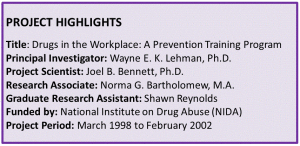
The long-term objectives of this project included development tools for assessing substance abuse risk in the workplace and to identify factors which contribute to drug use and impaired job performance. Major findings have been that personal background factors, particularly general deviance indicators, are the strongest predictors of personal substance use, and that substance use has strong associations with negative job behaviors (e.g. psychological withdrawal, antagonistic behaviors, accidents, and exposure to workplace violence). The complex role of policy, work group processes, and organizational culture also have been examined. Findings show that employee tolerance for co-worker substance use, attitudes toward discrete policy components, and work group drinking climates are each predictive of risk for substance-use related problems.
These results led to the development of a prevention training program designed to address work group cultures and permissive attitudes that tolerate or enable employee substance use. It was designed to increase employee awareness of issues relating to workplace alcohol and other drug use and its consequences. Because these issues and consequences occur within an organizational context, the training addressed specific factors that aggravate employee substance use and prevent effective policy implementation. These factors included supervisor/co-worker relations, stress, work group climate, and organizational change.
Findings from this research are reported in a 2003 book, Workplace substance abuse prevention: Beyond drug testing to wellness, published by the APA, and numerous journal articles. Check the selected publications below or the complete Drugs in the Workplace publication list for more information.
Team Awareness
The prevention program from the Workplace Project produced a training package, Team Awareness, developed to train trainers by Drs. Joel Bennett and Wayne Lehman and is available to interested users. Team Awareness is the first program to be recognized as a workplace-based Model Prevention Program by the Substance Abuse and Mental Health Services Administration (SAMHSA).
Selected Publications
Bennett, J. B., & Lehman, W. E. K. (Eds.). (2003). Workplace substance abuse prevention: Beyond drug testing to wellness. Washington, DC: American Psychological Association. [Abstract]
Chapters include:
- Bennett, J. B. (2003). Introduction. [Abstract]
- Bennett, J. B., Reynolds, G. S., & Lehman, W. E. K. (2003). Understanding employee substance use: Toward a multi-level approach. [Abstract]
- Lehman, W. E. K., Reynolds, G. S., & Bennett J. B. (2003). Team and informational trainings for workplace substance abuse prevention. [Abstract]
- Bennett, J. B., Reynolds, G. S., & Lehman, W. E. K. (2003). Cautious optimism, next steps, and recommendations: The need for more research. [Abstract]
Bennett, J. B., & Lehman, W. E. K. (2001). Workplace substance abuse prevention and help-seeking: Comparing a team-oriented and informational training. Journal of Occupational and Health Psychology, 6(3), 243-254. [Abstract]
Bennett, J. B., Lehman, W. E. K., & Reynolds, S. (2000). Team awareness for workplace substance abuse prevention: The empirical and conceptual development of a training program. Prevention Science, 1(3), 157-172. [Abstract]
Bennett, J. B., & Lehman, W. E. K. (1999). Employee exposure to coworker substance use and negative consequences: The moderating effects of work group membership. Journal of Health and Social Behavior, 40, 307-322. [Abstract]
Bennett, J. B., & Lehman, W. E. K. (1999). The relationship between problem co-workers and quality work practices: A case study of exposure to sex, drugs, violence, and stress. Work & Stress: An International, Multidisciplinary Quarterly of Stress, Health, and Performance, 13(4), 299-311.
Bennett, J. B., Lehman, W. E. K., & Forst, J. K. (1999). Change, transfer climate, and customer orientation: A contextual model and analysis of change-driven training. Group & Organization Management, 24(2), 188-216. [Abstract]